
Göteborg Book Fair, 2010.
Photo: Bengt Oberger.
Nadine Gordimer
The Nobel Prize in Literature 1991
Writer, illustrated consequences of apartheid. For fifty years the ‘Geiger Counter of Apartheid.
“My answer is: Recognize yourself in others”.” A child understands fear, and the hurt and hate it brings”. “Time is change; we measure its passing by how much things alter”.
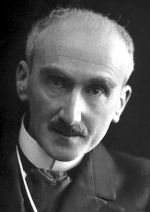
Henri Bergson
The Nobel Prize in Literature 1927
Philosopher, Essayist wrote in French. Rich and vitalizing ideas and brilliant skill in presentation. President, Commission for Intellectual Cooperation of League of Nations.
Philosophical system demonstrating Nobel’s idea of acknowledging with his Prizes, not human deeds but new ideas revealed through select personalities. Regain for man’s consciousness the divine gift of intuition and to put reason in its proper place: serving and controlling ideas.
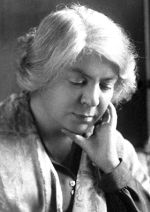
Grazia Deledda Ph.D.
The Nobel Prize in Literature 1926
Italian writer. Idealistically inspired writings picture life with clarity. With depth and sympathy deal with human problems in general. Criticize moral norms and social values, but not criticize people who are victims of circumstances. Pet crow.
Constant faith in humankind and in God

Photo Wikimedia Commons
George Bernard Shaw
The Nobel Prize in Literature 1925
Award: “for his work which is marked by both idealism and humanity, its stimulating satire often being infused with a singular poetic beauty.”
“The reasonable man adapts himself to the world; the unreasonable one persists in trying to adapt the world to himself. Therefore, all progress depends on the unreasonable man.”
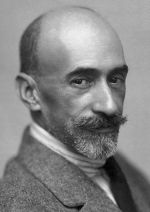
Jacinto Benavente
The Nobel Prize in Literature 1922
Spanish dramatist. In happy manner he continued the illustrious traditions of the Spanish drama. Chiefly writer of comedies of manners and of one-act farces. Upon pediatrician father, at death, leaving comfortable income, he abandoned law studies.
“You meet the warrior when in battle but it is not until victory that you meet the gentleman”.
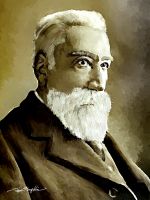
Tim Tompkins –
PaintHistory.com
Anatole France
The Nobel Prize in Literature 1921
Novelist, storyteller; almost all genres. Nobility of style, profound human sympathy, true Gallic temperament. Historical fiction evokes past civilizations with great charm, deep insight.
Post-World War I. At Nobel ceremony Frenchman France turned to Nobelist, German Nernst, exchanged a long and cordial handshake with him – a profoundly symbolic gesture.
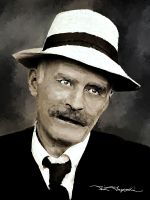
1865-1949 Painting
Tim Tompkins –
PaintHistory.com
Knut Pedersen Hamsun
The Nobel Prize in Literature 1920
Norwegian writer. In youth, poverty stricken. Little formal education. Leader of Neo-Romantic revolt. Promoted individualism. Exciting description of nature.
“I sat looking at her with rapt attention. What a wonderful pleasure to be sitting in a human dwelling again, and talk with a lively young girl instead of with myself!”
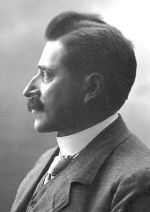
Carl Gustaf Verner von Heidenstam
The Nobel Prize in Literature 1916
Swedish Poet, Writer. New era in Swedish literature. Perspectives to inner life. Love for ancestral hearth and for home of one’s birth most strongly links man to life.
“O Man, you will become wise only when you reach the summit of the evening-cool heights where all the earth is beheld”
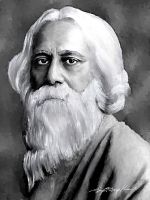
PaintHistory.com
Rabindranath Tagore
The Nobel Prize in Literature 1913
Indian Poet, Bangali, English. All literary genres. Voice of India’s Spiritual Heritage. Social reformer. Promoted gender equality, empowerment of women. Indian National Movement participant. Mahathma Gandhi was his devoted friend. Founder, school in Shantiniketan. Author, National Anthem of India, Bangladesh, Sri Lanka.
“Love does not claim possession, but gives freedom.”
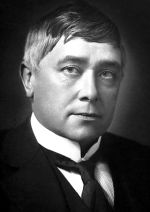
Count Maurice (Mooris) Polidore Marie Bernhard Maeterlinck
The Nobel Prize in Literature 1911
Belgian writer in French. Lawyer. Many-sided literary activities. Dramatic works distinguished by a wealth of imagination. Poetic fancy. Reveals deep inspiration. Appeals to readers’ own feelings, stimulates their imaginations.
When we lose one we love, our bitterest tears are called forth by the memory of hours when we loved not enough.

Paul Johann Ludwig Heyse
The Nobel Prize in Literature 1910
German writer: drama, poetry, prose. World-renowned short stories. Idealism. Consummate artistry permeated with idealism. Philology. Doctorate for dissertation on the refrain in Provençal poetry. Nobleman.
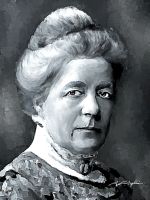
Painting Tim Tompkins –
PaintHistory.com
Selma Ottolia Lovisa Lagerlöf
The Nobel Prize in Literature 1909
Author. Lofty idealism, vivid imagination. Described peasant life, Nordic nature accompanied by ethical strength, deep religious feeling. Respect for Nature, Women’s Causes. 1914, became member of the Swedish Academy which awards Nobel Prize for Literature.
“Nothing on earth can make up for the loss of one who has loved you.”
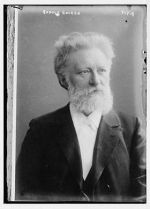
Rudolf Christoph Eucken
The Nobel Prize in Literature 1908
Writer, Philosopher.
Idealism raises our life to greatness above the hubbub of everyday life by representation of eternal truths; in midst of our dark situation it can strengthen our belief in reason of life. Only faith can enable us to cope with enormous obstacles, fill us with confidence of success.
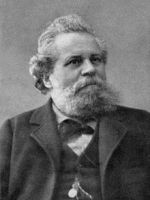
Giosuè Carducci
The Nobel Prize in Literature 1906
Nobel Co-recipient Ernesto Teodoro Moneta
Poet, Senator. Wrote poetry as child. Excellent translator, literary historian, orator. Conducted research in every phase of literature and eloquently expressed his findings. Poetry inspired compatriots in war for Italian independence, enjoyed immense popularity at home and abroad. Greatest Italian literary figure in the latter part of the nineteenth century.